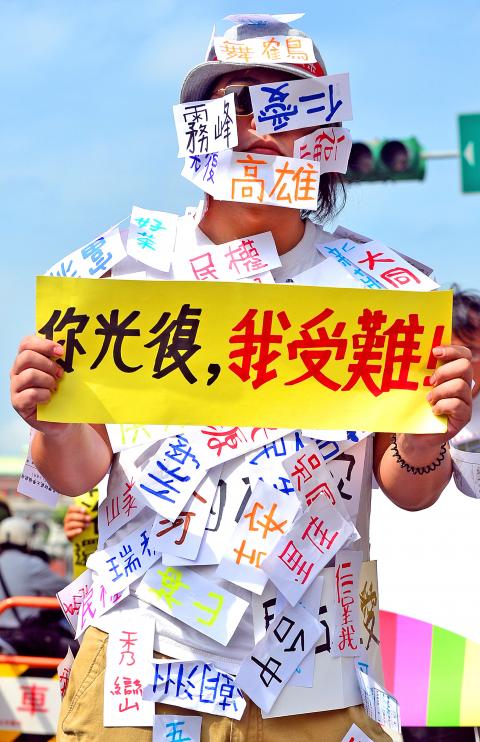|
Aboriginal activists call for town name changes
CONNOTATIONS: The activists said some current names had inappropriate political meanings and that Aborigines are living ‘in exile in their own lands’
By Loa Lok-sin / Staff reporter

An Aborigine, covered in place names Aboriginal groups say were imposed by the government and have political connotations, protests on Ketagalan Boulevard yesterday. The sign says: “Your nation was restored, we were visited by disaster” and is a reference to Guangfu, which means “glorious restoration” in Chinese.
Photo: Wang Yi-sung, Taipei Times
Aboriginal rights activists yesterday rallied on Ketagalan Boulevard in Taipei, calling for changes to place names in Aboriginal regions across the country from the current government-imposed names that hold political connotations.
Dozens of activists yesterday rallied on the road in front of the Presidential Office Building, protesting the government’s naming of places such as Guangfu Township (光復) in Hualien County and Fusing Township (復興) in Taoyuan County.
The term guangfu literally means “restoration of Taiwan,” referring to the Chinese Nationalist Party (KMT) regime’s takeover of the country after the Japanese surrendered in 1945, while the term fusing means “revival of the nation,” referring to the KMT regime’s goal to reclaim the mainland.
In addition, Renai (仁愛) and Sinyi (信義) townships in Nantou County mean “benevolence” and “fidelity and honesty” respectively, while Heping District (和平) in Taichung means “peace.”
“There are 55 Aboriginal townships around the country, but during 30 years of the Aboriginal rights movement, only the former Wufeng Township (吳鳳) in Chiayi County and the former Sanmin Township (三民) in former Kaohsiung County have been successfully renamed — Alishan and Namasiya — so far,” said Yapasuyongu Akuyana, a Tsou Aborigine representing the Indigenous Peoples’ Action Coalition of Taiwan, addressing demonstrators and the media. “As more and more tribal elders who still clearly remember the original Aboriginal place names are leaving us, those names will eventually be forgotten if we don’t stand up to demand the change now.”
“Wufeng” is the name of a historic figure who is said to have sacrificed his own life to “correct” the headhunt custom of Tsou Aborigines, while “sanmin” refers to the Three Principles of the People coined by Republic of China founder Sun Yat-sen (孫逸仙).
Lin Shih-wei (林世偉), an Atayal artist from Jianshi Township (尖石), Hsinchu County, burst into tears while saying that the government has not only taken their lands, but also changed the names, forcing them into exile on their own lands.
“I am especially heartbroken that, despite our invitations, none of the Aboriginal lawmakers showed up in the rally,” he said.
Earlier in the week, a group of young Amis Aborigines from Tafalong and Fata’an villages in Guangfu protested the township’s name by painting the two villages’ names and the question “whose restoration is it?” on the walls of the Guangfu Township Office.
source: Taipei Times
|